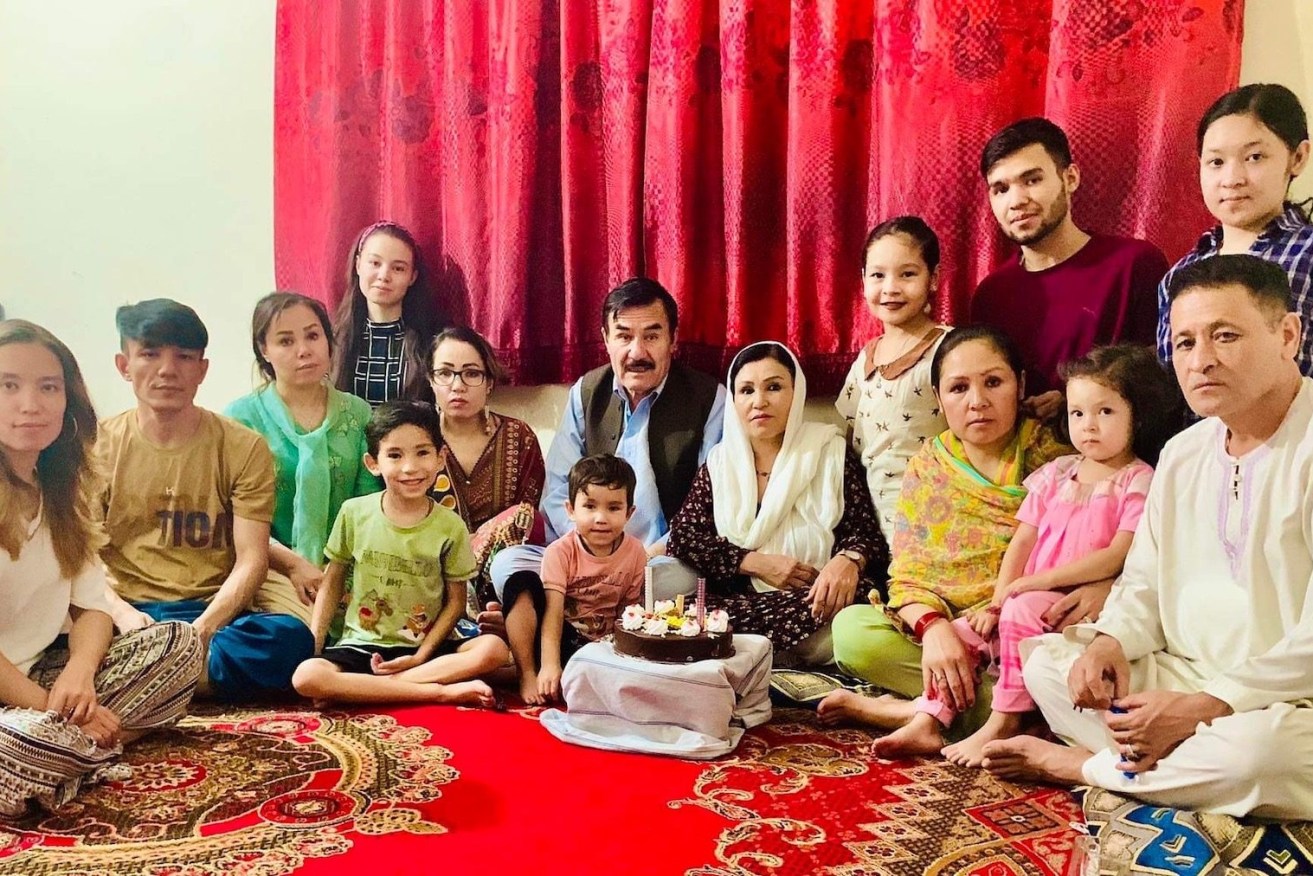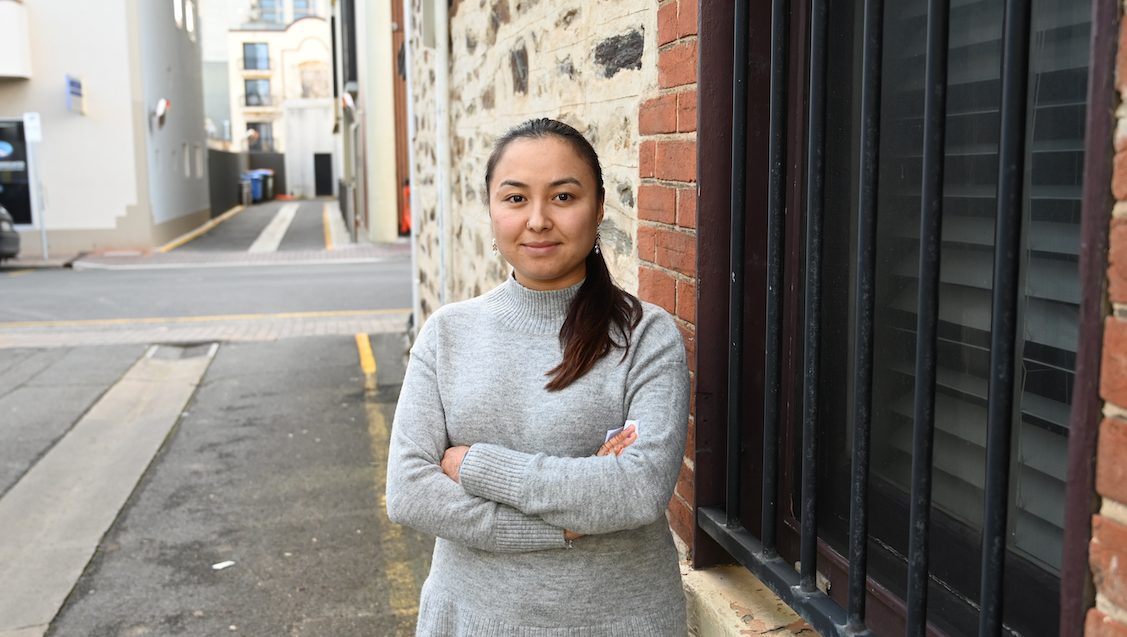Visa logjam: Adelaide plea for Afghans left to Taliban fate
Fahima Ahmadi tried to enter Kabul airport seven times before making it onto the last plane out of war-torn Afghanistan in 2021. Now the former allied interpreter is battling bureaucracy to bring her family safely to Adelaide.


Afghan refugee Fahima Ahmadi is desperately trying to get her family (pictured) safely to Adelaide. Photo supplied
When allied forces pulled out of Afghanistan in 2021 leaving the country to the Taliban, the Australian Government promised to grant 26,500 family and humanitarian visas until 2026.
Fahima is one of only 12,505 people to have been granted one of those visas in the past two years. Now the money she earns working for South Australia’s Migrant Resource Centre is paying for housing, food and medicines to keep her family of 17 alive as they shelter in Pakistan.
All were forced to flee their home as Taliban forces began targeting women and the family’s Hazara minority cultural group. The family were in added danger knowing the Taliban would find recordings of Fahima working for the United States and Australia in Kabul.
“When you live in a war zone there are people dying around you. I have crossed a street and two minutes after a bomb has exploded …. I know what they are struggling with now,” Fahima says.
“Now there are punishments for women, a lot are killed for not wearing the proper clothes or for walking in the street with no men, they will be punished, they will be beaten, it has turned very normal, but countries around the world are not helping people in Afghanistan.”
There are some who are trying. Independent South Australian federal MP Rebekha Sharkie held an event in February calling for a new skilled migrant scheme to be established to bring more persecuted women from Afghanistan to Australia.
Just this week, the Taliban closed all beauty salons in Afghanistan. They provided some of the last places for women to work, with women and girls already banned from most workplaces, parks, schools and universities.
Sharkie is still trying to meet with Immigration Minister Andrew Giles to talk about the idea that could bring more Afghan women seeking refuge to Australia.
This slow-moving beast that is bureaucracy is almost unbearable for refugees like Fahima.
Department of Home Affairs figures show that from August 15, 2021, to May 19 this year, it received 189,603 applications for Afghan family and humanitarian visas.
Of those, 12,203 were granted and more than 30,000 rejected, leaving more than 135,000 lives hanging in the balance.
Fahima received a case number for an application seeking refuge for her family on November 6 last year. “I send follow ups to the department, updates from my family, support from my work, I go where ever I can to find help,” she says.
But she fears Australians has forgotten about the plight of her country.
“It’s a habit of human beings, a habit of forgetting if it’s is more than a year ago.”

Former interpreter Fahima Ahmadi was on the last Australian rescue flight from Afghanistan in 2021. Photo: Belinda Willis
There is a deep sadness as she speaks of her seven sisters, two brothers, and their children, about the impact on their lives as they miss out on school, university and work.
“Their dreams are being destroyed,” she says, adding that the family is in limbo as Pakistan does not provide support or allow them to work as family members try to find refuge in another country.
Fahima is also haunted by visions of the turmoil and fear as the United States and allied forces rapidly pulled out of Kabul in 2021 leaving its people to their fate.
Two days before a bomb went off outside the gates of Kabul airport on August 26, 2021, killing 183 people, Fahima was waiting in intense heat near the explosion site with two friends anxiously trying to get inside the perimeter.
Fahima was carefully guarding a sponsor letter from Australian Airforce Commodore Kirrily Dearing that would secure her a spot on a plane as she was deemed at serious risk after previously working with the Australian and American forces as an interpreter.
Dearing was recognised last year in the Queen’s birthday list for her exceptional service to the Australian Defence Force in “strategic engagement, integration of women in Afghan society, and military responses to international and domestic operations”.
It was the seventh time Fahima had tried to get inside the airport.
Carefully covered by a hijab, she had negotiated Taliban checkpoints with family members on many days, their efforts thwarted by the mass of humanity trying to escape the increasingly dangerous city being abandoned.
“I didn’t think I would get through,” Fahima says in Adelaide, stopping for a moment as tears come; “I didn’t even get to say goodbye to my family, no one, I said I didn’t think I would get into the airport and I would be back.”
But this time, Fahimi made it through a gate after camping outside for two days. After another night sleeping inside the airport with no food or water, Australian soldiers rushed her onto the last flight out of Kabul with 300 Afghan families.

Desperate Afghans on the Kabul airport runway as a USAF plane leaves during the allied evacuation. Photo: AAP, UGC via AP
They travelled to Dubai to stay in a camp for two weeks before touching down in Brisbane, Fahima saying she and her friend chose Adelaide as their new home after being told it was smaller and affordable.
It is quiet and safe here, but Fashima still feels intense fear for her family. There are also the memories that arrived with her, sounds of bombs going off, of women walking alone being beaten or killed. Her own father was attacked and beaten three times, dragged from his car and robbed.
There is joy, too. Fahima smiles as she tells of her engagement to Mudsir Akbar who she met in Australia, but the happiness is tinged with traumatic visions and an intense fear for her family.
She will not stop fighting to have them here safe too.
“My mother is very sick,” Fahima says. “Every year I spend in Australia it is getting harder for me to understand what is happening, I’m still having the fear and now I keep seeing it all coming back to me.”




